If you're struggling with musty odors in your basement, it's time to invest in a great air purifier. The top picks include the Afloia Air Purifier, which covers up to 1,076 sq ft, and the LEVOIT Essential 200S-P, perfect for large areas. The PuroAir device works efficiently in spaces up to 1,115 sq ft, while the MOOKA H13 excels with its ultra-quiet design. Finally, the LEVOIT Essential 100S-P offers smart features for added convenience. Choosing the right purifier can vastly improve your air quality, and there's more to explore about each model's features and benefits.
Afloia Air Purifier for Home Bedroom
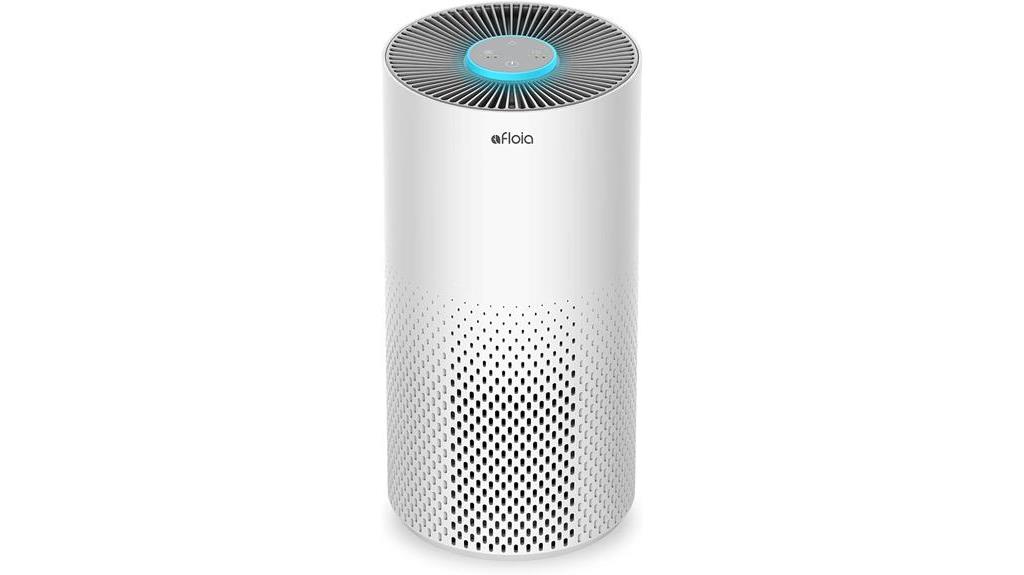
If you're struggling with musty odors and poor air quality in your basement, the Afloia Air Purifier for Home Bedroom is a fantastic choice. It effectively covers large spaces up to 1076 square feet, making it perfect for tackling those stubborn smells. With its three-stage filtration system, it captures 99.99% of particles as small as 0.03 microns, including pet dander and mold, which greatly improves indoor air quality. I love how quietly it operates at just 22 dB in sleep mode, ensuring I can rest undisturbed. Plus, the sleek design fits seamlessly into any room. While the replacement filters can be a bit pricey, the noticeable improvement in air quality is worth it for me.
Best For: Individuals seeking to improve indoor air quality in large spaces, especially those with pets, smokers, or musty odors.
Pros:
- Effective three-stage filtration system that removes 99.99% of particles.
- Operates quietly at 22 dB in sleep mode, allowing for undisturbed rest.
- Sleek, modern design that blends well with any home decor.
Cons:
- Replacement filters can be expensive to maintain.
- Lacks an automatic mode to adjust fan speed based on air quality.
- Some users noted the absence of a filter replacement indicator.
LEVOIT Air Purifier for Large Rooms (Vital 200S-P)
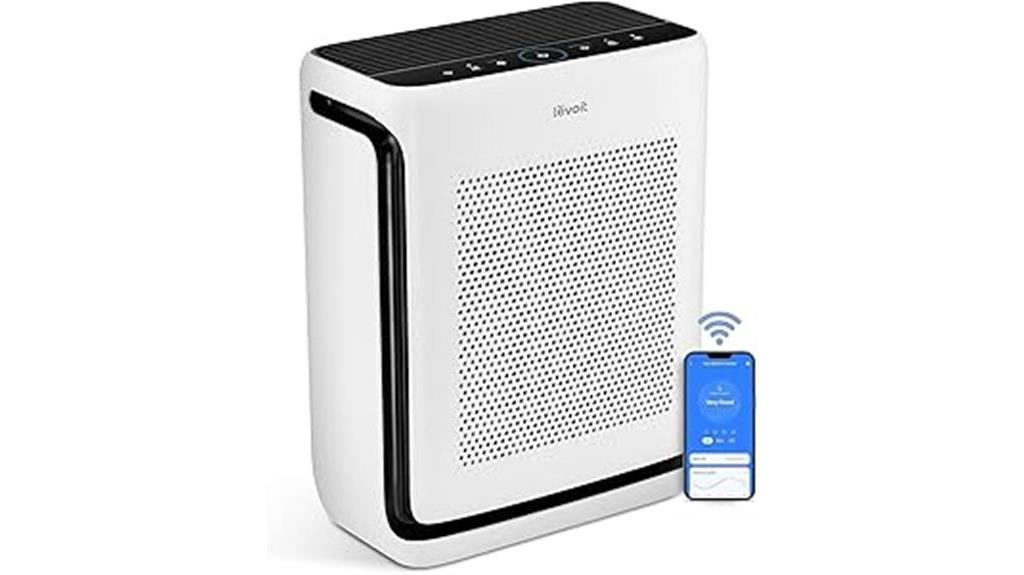
For anyone struggling with air quality issues in a musty basement, the LEVOIT Essential 200S-P air purifier stands out as an excellent choice. It covers large rooms up to 1800 square feet, purifying the air once every hour. With a CADR of 242 CFM, it effectively creates smoke-free environments. Its 3-stage filtration system captures 99.97% of ultra-fine particles, making it a fantastic option for those with allergies.
I love the smart features too; I can control it via the VeSync app or even with Alexa. The Auto Mode adjusts the fan speed based on air quality, ensuring my space remains fresh. Plus, it operates quietly, especially in Sleep Mode, so I can enjoy undisturbed rest in my clean, crisp basement air.
Best For: Individuals with allergies or pet owners seeking to improve air quality in large spaces.
Pros:
- Effective filtration captures 99.97% of ultra-fine particles, enhancing air quality.
- Smart features allow control via the VeSync app and compatibility with Alexa for convenience.
- Quiet operation in Sleep Mode ensures undisturbed rest while purifying the air.
Cons:
- Initial setup may require some time for app connectivity and settings adjustment.
- Replacement filters are necessary over time, which may add to maintenance costs.
- Size and weight might be cumbersome for smaller rooms or frequent relocation.
PuroAir Air Purifier for Homes (Covers 1,115 Sq Ft)
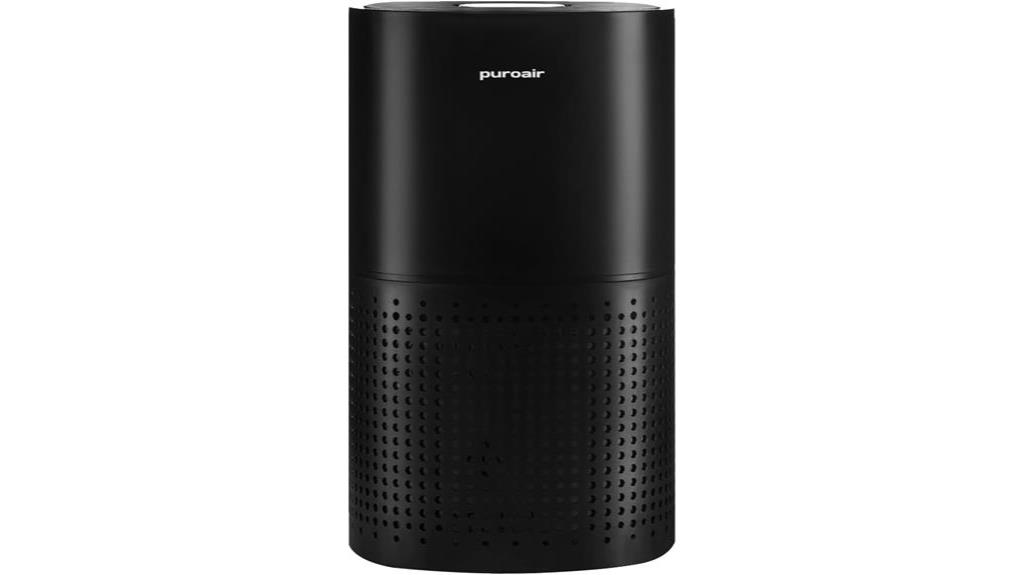
The PuroAir Air Purifier stands out as an ideal choice for those dealing with musty basements, thanks to its impressive coverage of 1,115 square feet. I appreciate how it cleans the air automatically 24/7, effectively filtering up to 99% of smoke, pollen, and other pollutants. With a smart particle sensor, it adjusts its power based on the air quality, showing noticeable improvements within just 15 minutes of use.
I've found its quiet operation to be a significant plus, especially on lower settings. The timer, fan speed options, and sleep mode make it user-friendly. While replacement filters can be pricey, the overall performance—relieving allergies and eliminating odors—makes it worth it in my eyes.
Best For: Those seeking an effective air purifier to alleviate allergies and improve air quality in large spaces up to 1,115 sq ft.
Pros:
- Quiet operation on low and medium settings, making it suitable for use in bedrooms and living areas.
- Smart particle sensor automatically adjusts the purification power based on real-time air quality.
- Fast noticeable improvement in air quality, often within just 15 minutes of use.
Cons:
- Replacement filters can be expensive and may require frequent changes depending on home conditions.
- Lightweight construction may raise concerns about durability over time.
- Voltage compatibility issues may arise for international buyers, necessitating a step-down unit for 240V systems.
MOOKA H13 True HEPA Air Purifier for Large Rooms
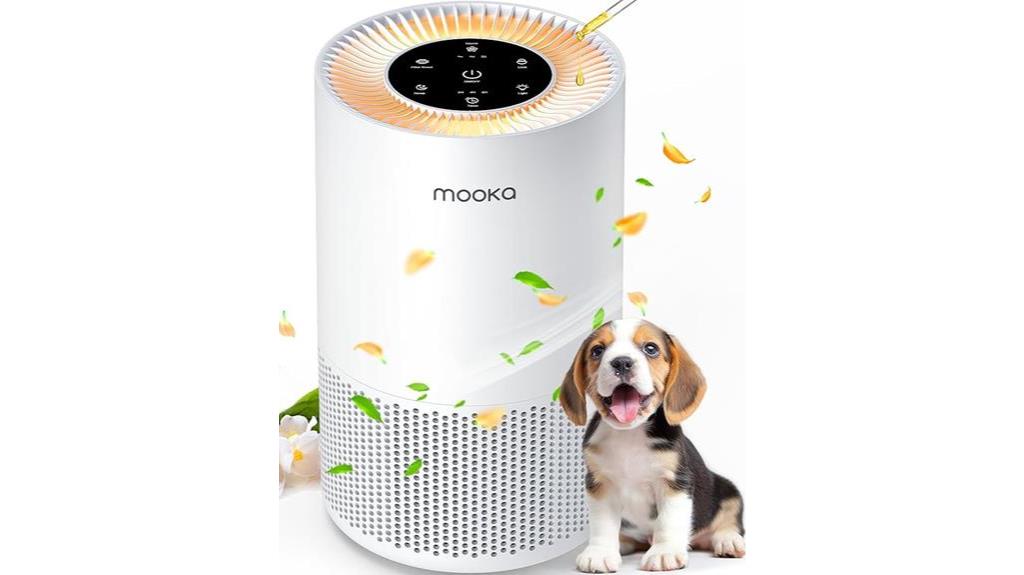
Designed specifically for larger spaces, the MOOKA H13 True HEPA Air Purifier stands out as an ideal solution for anyone dealing with musty basement odors and allergens. It effectively covers areas up to 1200 square feet, making it perfect for larger rooms. The imported true H13 HEPA filter captures a variety of particles, including smoke, dust, and pet dander. With four fan speeds and a sleep mode, it operates ultra-quietly at just 13dB, so you won't even notice it's on. I love the added aromatherapy feature, allowing me to enjoy my favorite essential oils. Compact and energy-efficient, this purifier is both effective and affordable, earning an impressive 4.5-star rating from users.
Best For: Those seeking an effective air purification solution for larger spaces, particularly pet owners and individuals sensitive to allergens.
Pros:
- Compact design makes it suitable for various rooms, including bedrooms and offices.
- Ultra-quiet operation at just 13dB ensures minimal disturbance during sleep or work.
- Aromatherapy feature allows users to enhance their environment with essential oils.
Cons:
- Frequent filter replacement may be necessary in high-dust environments.
- Limited to indoor use, as it is not designed for outdoor air purification.
- Timer settings may not be intuitive for all users.
LEVOIT Air Purifier for Large Rooms (Vital 100S-P)
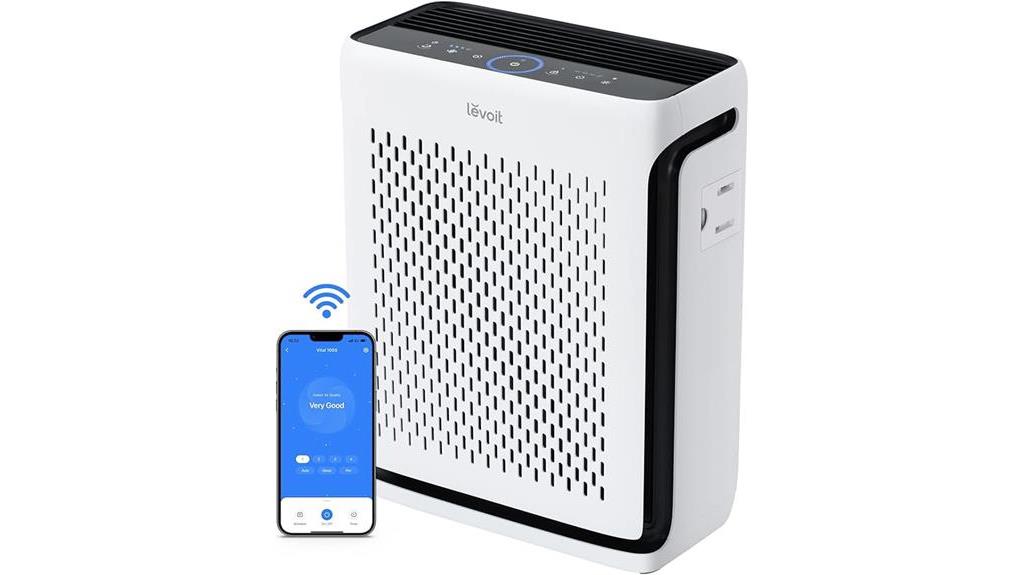
If you're struggling with musty odors and allergens in your large basement, the LEVOIT Essential 100S-P Air Purifier is a game changer. Covering up to 1,110 square feet, it uses a 3-stage filtration system, including a washable Pre-Filter and a High-Efficiency Activated Carbon Filter, achieving 99.97% efficiency against tiny particles like pollen and dust. I love the multiple modes—Pet Mode and Sleep Mode are especially helpful for my family's needs. With WiFi connectivity, I can control it through the VeSync app, set timers, and monitor air quality right from my phone. It's quiet, efficient, and easy to maintain. Overall, I highly recommend it for anyone looking to improve air quality in their home.
Best For: Individuals or families seeking to improve air quality in large rooms, particularly those with allergies or pets.
Pros:
- Quiet operation in Sleep and Auto Modes, making it ideal for nighttime use.
- WiFi connectivity allows for convenient control and monitoring via the VeSync app.
- Effective filtration system captures 99.97% of airborne particles, improving overall air quality.
Cons:
- Some users have concerns about privacy requirements associated with the app.
- Off-brand filters may cause damage, requiring users to purchase original filters.
- Replacement of the main filter is needed every six months, which may add to maintenance costs.
Factors to Consider When Choosing Air Purifiers for Musty Basements
When picking an air purifier for your musty basement, you should consider several key factors. Look at the efficiency of the filtration system, the coverage area for your space, and how noisy it might be during operation. Also, think about maintenance needs and whether you'd like any smart features to enhance your experience.
Filtration System Efficiency
Choosing the right air purifier for musty basements hinges on understanding the efficiency of its filtration system. Look for a multi-stage filtration setup that includes a pre-filter, HEPA filter, and activated carbon filter. This combination can effectively remove at least 99.97% of particles as small as 0.1 microns, essential for tackling mold spores and musty odors often found in damp environments.
The activated carbon filter is especially important as it absorbs and neutralizes unpleasant smells, greatly improving air quality. When you're evaluating options, pay close attention to the Clean Air Delivery Rate (CADR) ratings. A higher CADR indicates more filtered air delivered per minute, which is crucial for larger spaces like basements.
Additionally, consider smart air purifiers equipped with particle sensors. These devices can automatically adjust their fan speed based on real-time pollutant levels, ensuring efficient operation tailored to your basement's specific air quality needs. Finally, don't forget about regular filter maintenance. Following the manufacturer's replacement recommendations—typically every 4-6 months—is essential to maintain ideal performance and effectively remove airborne contaminants.
Room Size Coverage
A key factor in selecting an air purifier for musty basements is guaranteeing it effectively covers the room size. Most basements are at least 1,000 square feet, so you'll want an air purifier designed to handle that space. Look for models with a high Clean Air Delivery Rate (CADR) to confirm that they can circulate and filter the air multiple times an hour. This is essential for combating humidity and mustiness, which are common issues in basements.
When evaluating options, focus on the filtration system as well. A three-stage filtration system that incorporates a HEPA filter and an activated carbon filter is vital. This combination will help trap mold spores and eliminate unpleasant odors that can linger in damp environments.
Additionally, consider features like a smart particle sensor. This technology adjusts the purifier's power based on the air quality, making it particularly effective in a musty basement. By prioritizing these aspects, you'll guarantee that your chosen air purifier not only fits your basement's size but also meets the unique challenges of maintaining fresh air in a damp setting.
Noise Level Considerations
Noise level is an important consideration that can greatly affect your comfort in a musty basement. When choosing an air purifier, you'll notice that models can vary considerably in noise output. Some operate as quietly as 22 dB in sleep mode, making them perfect for undisturbed rest. If you prefer a bit of sound, many purifiers produce a gentle hum at higher speeds, providing soothing white noise that can help mask the otherwise isolated atmosphere of a damp basement.
It's wise to select an air purifier with multiple operation modes, including sleep mode. This flexibility allows you to customize the noise level based on your needs throughout the day and night. For maintaining a peaceful environment, aim for purifiers that operate quietly on low settings. This way, you can enjoy fresh air without the distraction of loud machinery.
Understanding the decibel levels of different models empowers you to find the right balance between effective air cleaning and minimal noise disruption, which is especially vital in lower living areas like basements. Prioritize noise considerations to guarantee your space remains comfortable and inviting.
Maintenance and Filter Replacement
When it comes to maintaining ideal air quality in musty basements, regular upkeep of your air purifier is vital. To maximize performance and guarantee clean air, you'll need to clean or replace filters every 3-6 months, depending on usage and air quality. In humid conditions, like those often found in basements, filters specifically designed for odor and mold removal can greatly enhance air quality.
Many air purifiers come with washable pre-filters, which you can clean with water. This feature can extend the life of your main filters and improve efficiency, saving you money in the long run. It's important to monitor any filter replacement indicators your unit might have. Neglecting to change filters can lead to decreased airflow and reduced purification effectiveness, which is the opposite of what you want in a musty environment.
Lastly, be aware of the cost and frequency of filter replacements. Some filters can be pricey and may require more frequent changes in high-pollution areas. Keeping track of these factors will help guarantee your air purifier works effectively, providing the fresh air your basement needs.
Smart Features Availability
Smart features in air purifiers can greatly enhance your experience, especially in musty basements where air quality is a concern. Look for models with WiFi connectivity and app control, as these allow you to monitor air quality and adjust settings remotely. This means you can manage your air purifier from anywhere, ensuring your basement stays fresh even when you're not there.
Automatic modes are another great feature to take into account. These adjust fan speeds based on real-time air quality readings, making your purifier more efficient in handling humidity and allergens typical of musty environments. Additionally, light sensors can automatically dim display lights and adapt operation based on ambient light, promoting energy savings and comfort during the night.
Programmable settings are also useful, letting you set specific operating schedules that fit your unique needs. Finally, advanced models often include filter life indicators, helping you keep track of maintenance and ensuring peak performance. With these smart features, you can create a healthier atmosphere in your basement, making it a more pleasant space to spend time in.
Frequently Asked Questions
How Often Should I Replace the Air Filter in My Purifier?
You should replace the air filter in your purifier every 3 to 6 months, but it really depends on your usage and the type of filter. If you have pets or allergies, you might need to change it more often. Always check the manufacturer's guidelines for specific recommendations. Keeping the filter clean guarantees your purifier works efficiently, helping improve the air quality in your space and keeping you healthy.
Can Air Purifiers Eliminate Mold and Mildew Odors?
Imagine walking into a room that smells as fresh as a mountain breeze. Air purifiers can greatly reduce mold and mildew odors, but they can't eliminate them entirely on their own. They work by trapping airborne spores and particles, which helps improve air quality. To tackle persistent smells, combine your purifier with proper ventilation and humidity control. You'll create a healthier, fresher environment, making your space much more enjoyable to be in.
Are Air Purifiers Safe for Pets and Children?
Yes, air purifiers are generally safe for pets and children. Most models use HEPA filters and activated carbon, which don't pose any harm. However, you should avoid ozone generators, as they can release harmful ozone levels. It's important to check the manufacturer's guidelines and guarantee the purifier operates quietly to avoid startling pets or waking kids. Keeping a clean environment helps everyone breathe easier and stay healthy in your home.
Do Air Purifiers Consume a Lot of Energy?
Air purifiers generally don't consume a lot of energy, especially when you compare them to other household appliances. Most models are designed to be energy-efficient, often using less power than a standard light bulb. You can run them continuously without drastically increasing your electricity bill. Just check the Energy Star rating for the most efficient options, and you'll find ones that can help you breathe easier without breaking the bank.
Can I Use an Air Purifier Continuously Without Issues?
You might be surprised to learn that many air purifiers use less energy than a standard light bulb, averaging around 50 watts. Yes, you can run your air purifier continuously without issues. In fact, keeping it on helps maintain cleaner air and reduces allergens. Just guarantee you regularly replace the filters to maximize efficiency. Continuous use is a great way to keep indoor air fresh and healthy for you and your family.
Wrapping Up
To sum up, choosing the right air purifier for your musty basement can drastically improve your indoor air quality. With options like the Afloia and LEVOIT, you're bound to find a model that fits your needs and space. Why settle for stale, musty air when you can breathe fresh, clean air at home? Investing in a quality air purifier not only enhances your comfort but also promotes better health for you and your family.

Hi, I’m Charlie, and I cover all things laundry here at Appliance Mastery.
I’ve spent over eight years working on washing machines, dryers, and dishwashers. I also have a degree in mechanical engineering, which helps me understand how these appliances really work.
I try to make every guide clear and practical. If you’re stuck with a noisy dryer or a leaking washer, I’ll help you figure out what’s wrong and how to fix it.
